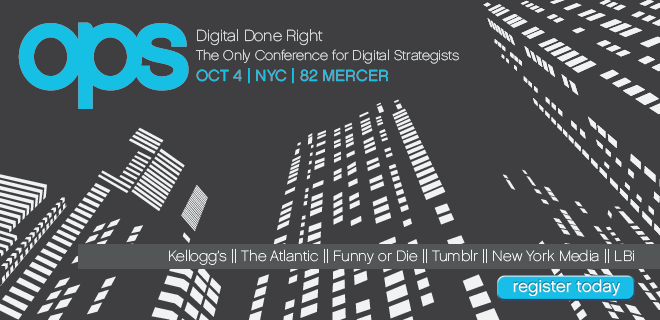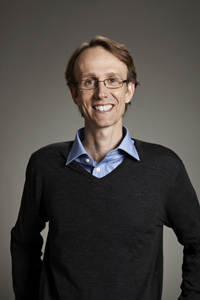
After 24 years at Publicis, with the most recent role being CEO at the VivaKi Nerve Center, Curt Hecht made the leap across the aisle to joining his old VivaKi boss David Kenny at The Weather Channel. But making his move to the role of Global Chief Revenue Officer wasn’t just about TWC’s remarkable forward thinking when it comes to publishers’ relationship with data – as he explains below, he really loves the weather. We also asked the OPS panelist for his thoughts on private exchanges, multiscreen challenges and brands investing in prorammatic buying along the lines of what co-panelist Bob Arnold is doing at Kellogg’s.
All right, you know we have to ask – why, man, why? Why leave the agency world for the publisher life? Is it weird now being on the other side?
It actually hasn’t been such a drastic change. I still work with advertisers all the time, and my job is still to work with a great team to find innovative, effective ad solutions that make sense for the consumer, the advertiser and our brand.
As for the reason I made the change, I was excited by the opportunity to work with CEO David [Kenny] again, and really shared his vision for The Weather Channel and its potential. My family and I were also ready to get back here from Paris, so really, all the stars aligned. I think when everyone sees where we’re at a year from now, it will seem really obvious why I came here.
Also, to be clear, I love the weather – it’s a huge part of my life and my family’s, and you need to love what you do.
 You were at Publicis for 24 years in a variety of roles – what’s your take on the state of agency digital marketing? What are the most impressive improvements and what are still pain points?
You were at Publicis for 24 years in a variety of roles – what’s your take on the state of agency digital marketing? What are the most impressive improvements and what are still pain points?
I started working in IT at Leo Burnett when I was still in college and it became a career in media. I think the agency state is the same as the media marketplace as a whole. Lots on ads, formats, data, audiences, and a world of infinite impressions means that software is required to solve the problem. Google was the shot over the bow and at this point, I think most companies realize that they need to understand technology and apply it. Success comes from the ability to invest, attract talent and execute.
How do you consider TWC changed since former VivaKi founder David Kenny came in as CEO? What are some of the bigger transformations in process?
We are focused on the weather! We know data is our core and we know it drives behavior and it can drive emotions. What you do and how you feel are really important to marketers and people. We are focused on leveraging weather as a platform and a network to connect the 1/3 of the economy that is heavily impacted by the weather. You will see a multitude of implementations that deliver on this vision from how we build “pollen” networks to creative on mobile that builds brands.
Simply, David has charged us with focusing on our core products and what I think really differentiates us among premium publishers is, at our core, we are a weather company, a company built on a foundation of science and technology, and not only does that allow us to provide our consumers with valuable information, it also allows us to provide our marketers with very interesting, actionable, results-producing data.
What I think David’s done is encourage us to focus on servicing this info to our marketers, leveraging as many channels as we can to make the process as simple as possible for them, and leverage the scientific foundation of our company to create powerful products for marketers.
You’re charged with overseeing both digital and cable ad sales – does that make TWC a digital-first company in terms of revenue strategy?
We are focused on the weather and people. The fact that we are the most distributed cable network and the biggest media company as an iPad app really means we need to be relevant in making sure people have what they need to plan their day, week and we need to be there on any screen they want us to be with them.
TWC was one of the first (if not the first) publishers to jump on the private exchange bandwagon. What have your thoughts been walking into that setup? How do you think it has developed over the last few years, especially in terms of multiscreen efforts?
The Weather Channel was one of the first publishers to set up a private ad marketplace. With our data, our scale and our sales teams, it makes sense for us to leverage as many channels as possible.
I think private exchanges suit a certain type of marketer well – they provide exclusive access and communication for us with some of our marketing partners. But they’re not for everyone. I think over the last few years, we’ve started to better understand whom those marketers are that make the most sense for us to engage in those types of partnerships with. And I think generally, technology improvements have allowed for the integration to occur much more easily than even a year or two ago.
As for multiscreen, we do look at this as an opportunity to achieve our marketers’ goals across four screens, because the buying process is so simplified. We’re working towards a platform-agnostic environment, where we simply execute on a marketer’s goals as effectively as we can across platforms.
At OPS you’ll be appearing on a panel with Bob Arnold of Kellogg’s, which has a pretty aggressive programmatic buying program. What are your thoughts on brands embracing programmatic buying strategies – inevitable? Unlikely to scale?
The largest brands have been the quickest to embrace the marketplace. Betsy Lazar [VP of Global Media at Kellogg Company] and I worked together on GM and it’s not a surprise that Kellogg is leading the path and she has great talent like Bob on her team. At the same time, we are having many similar conversations with other marketers and I think we all recognize that we need to have great ideas to build brand and leverage software in the evolved media marketplace.